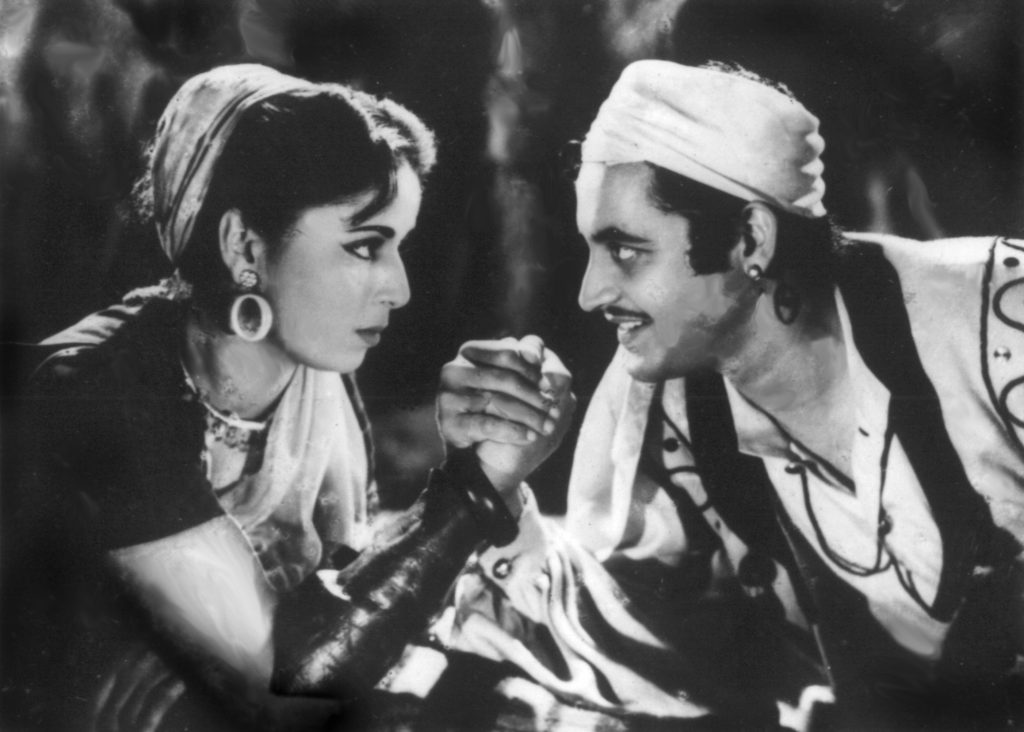Even the most ardent of Guru Dutt’s fans readily admit that Baaz (1953) is undoubtedly his worst film and a total misfire. His third film, following the huge box office success of Baazi (1951) and an average response to Jaal (1952) (both noirs), Baaz sees Guru Dutt debut as both – a leading man and producer (the film is co-produced with his heroine, Geeta Bali’s sister).
The film, a costume drama set in the 16th century, is supposedly a swashbuckler set amidst the high seas and looks at the rebellion against Portuguese rulers along the Malabar Coast. General Barbosa (KN Singh) signs a treaty with the queen (Sulochana) of a small state giving the Portuguese right to trade in exchange for military protection. With the help of the queen’s nephew Jaswant (Ramsingh), he begins to meddle in the administration as well. He arrests merchant Ramzan Ali and his friend Narayan Das. Das’ daughter Nisha (Geeta Bali) tries to save her father but is caught by Barbosa and both are sold to a cruel Portuguese pirate Cabral. Cabral kills Narayan Das and in retaliation, Nisha rouses her fellow slaves to revolt against Cabral. Once Cabral is killed Nisha becomes a pirate queen pillaging all Portuguese ships in sight. One such ship includes heir to the throne, Prince Ravi (Guru Dutt), a Portuguese woman, Rosita (Kuldip Kaur), and a court astrologer (Johnny Walker). Nisha spares their lives as Ravi had saved her life earlier. They inevitably fall in love. Ravi joins the mutineers without revealing his identity. Back on shore, Ravi learns Jaswant is to be crowned king. Ravi is arrested and sentenced to death. Nisha saves him and they join forces with other local chiefs to defeat Barbosa.
Sadly, there is very little to say or write about Baaz and its clunky narrative flow. The story is pretty awful, the screenplay woeful, the dialogues often unintentionally funny and as Dutt’s biographer, Nasreen Munni Kabir, mentions, there are but a handful of sequences which bear the so-called ‘Guru Dutt’ touch like the song Watan Ke Naujawaan Jaag, which, as it builds up to a crescendo, sees Cabral killed accompanied by the strains of a shrieking conch. The film is unable to successfully blend the elements of patriotism, action, and romance and consequently none of the tracks work even remotely satisfactorily. To make thinks even worse, the special effects are abysmal to say the least, with the main ship used in the film often looking like a pathetic toy boat!
As a leading man, Guru Dutt is just about passable and his performance is unremarkable and strictly average as are most of the rest of the cast but Geeta Bali more than manfully rises above the trite script and ably carries the film on her able shoulders as the firebrand pirate queen, Nisha. Kuldip Kaur too more than does her bit as she vamps it up deliciously as Rosita, the Portuguese woman who has her sights on Ravi. Her refrain of addressing him as “Huzoor” is a riot. Even more so when Ravi keeps her at bay and responds with “Zara Door!”
The real stars of the film and its major saving graces however are music director OP Nayyar and playback singer Geeta Dutt. The songs are brilliant be it Zara Saamne Aa, Manjhi Albele, Ae Dil Ae Deewane, Taare Chandni Afsane, Watan Ke Naujawaan Jaag, all Geeta Dutt solos and that Talat Mahmood romantic gem, Mujhko Dekho Hasrat ki Tasveer Hoon, among others.
However, sometimes in the midst of all gloom, there is a silver lining after all. The hostile critical and commercial reaction to Baaz made Dutt go back to the safer world of Bombay noir with his next offering, Aar Paar (1954), and the rest as they (always) say is history!
1953, Hindi, Swashbuckler, Patriotic, Historical Drama, Black & White


